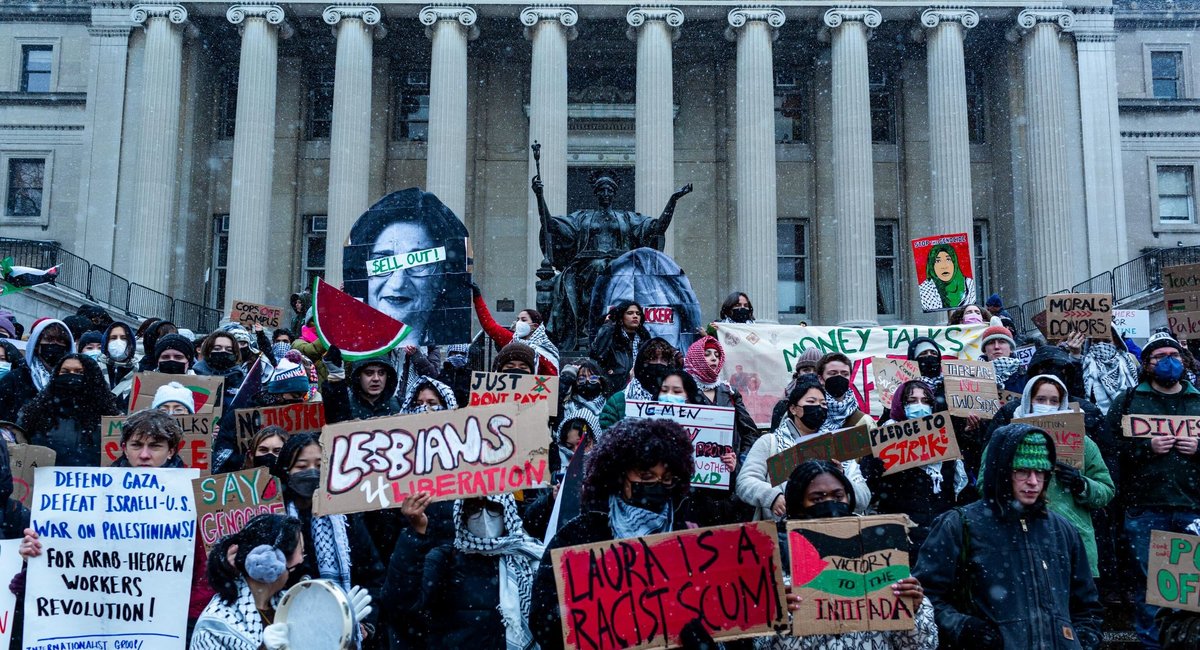After five months of controversy and protests, Columbia University’s president appears poised to restrict demonstrations on campus at New York City’s only Ivy.
In recent weeks, an advisory panel made up mostly of academics and administrators rejected pro-Palestinian students’ demand that the university divest from Israel, and recommended the president impose new limits on campus demonstrations. The restrictions include banning the use of speakers and megaphones, “real-time” intervention of protests by university authorities and “a more proactive effort” to identify masked protesters.
Columbia President Minouche Shafik welcomed the recommendations in a statement and said they’d be reviewed at the end of the semester.
“It is essential to ensure that debates and disagreements across Columbia are rooted in academic rigor and civil discourse, and that Jewish students, faculty and staff, and all members of our community feel safe, supported and included,” she said. “We are committed to ensuring that our rules both protect free speech and foster inclusivity at Columbia.”
The developments indicate a realignment toward “university neutrality” occurring throughout the Ivy League, experts said.
The leaders of Harvard University and the University of Pennsylvania resigned amid widespread criticism for their handling of antisemitism on campus in the wake of the Oct. 7 attack by Hamas militants in Israel. Shafik, who declined requests for an interview, has thus far avoided the same level of scrutiny. The advisory panels’ reports offer a hint at how she plans to manage campus life in the coming months.
“Until Oct. 7, it seemed like wisdom that [the institution] should not move towards neutrality, but should express solidarity with whichever group was more commonly perceived to be oppressed or marginalized,” said Houman Harouni, an expert in higher education governance at the Harvard Graduate School of Education. “Now, the complexity of the issue is pushing the universities to adopt a different tactic, and the easiest option they can go for is institutional neutrality.”
Shafik and other Columbia administrators are focused on making sure students continue to learn in the midst of protests over Israel’s ongoing invasion of Gaza, according to one senior leader who spoke to Gothamist on condition of anonymity.
Students on all sides of the ongoing conflict in Israel and Gaza continue to criticize the administration for not doing enough to make them feel safe. A lawsuit filed in February on behalf of pro-Israel students described Columbia as “one of the worst centers of academic antisemitism in the United States.”
The suit slammed university leaders of “Columbia’s abject failure and deliberate refusal to lift a finger to stop and deter this outrageous antisemitic conduct and discipline the students and faculty who perpetrate it.”
The NYCLU, meanwhile, filed a lawsuit on Tuesday on behalf of Columbia’s chapters of Students for Justice in Palestine and Jewish Voice for Peace over the suspensions of both student groups for organizing unauthorized protests.
“We’ve been seeing policy change after policy change, especially this semester. The repression has been bad,” said Maryam Alwan, a leader of Columbia’s Students for Justice in Palestine and a fourth-year student at the university. “It makes me feel completely erased, they don’t want us to exist at all, with or without demonstrations.”
Pro-Palestinian protesters at Columbia have demanded that the university cut all financial ties with Israel, including investments tied to its $13 billion endowment and academic exchange programs.
Students at NYU and CUNY Law School have made similar demands at those colleges.
Columbia’s “advisory committee on socially responsible investing” issued a report on Feb. 29 rejecting protesters’ claim that a majority of the campus community supported divestment.
“A majority is not broad consensus, and the campus community is not the university community, which includes all living alumni, faculty and students,” the report read, adding that the request “does not meet the broad consensus test required for consideration of divestment.”
A separate report by the Task Force on Antisemitism, which recommended new limits on demonstrations, criticized pro-Palestinian protesters’ conduct. Shafik convened the task force as protests rocked the campus in November.
“Protesters have disrupted classes and events, taken over spaces in academic buildings, held unauthorized demonstrations, and used ugly language to berate individuals who were filming these protests or just walking by. There also have been reports of physical harm to students, including Columbia affiliates who were protesting against Hamas and Columbia affiliates who were protesting against Israel,” the report read.
The report noted that many of its recommendations to combat antisemitism could be used against “Islamophobia, anti-Arab racism and other types of bigotry.”
“We condemn all these toxic forms of hate,” the report read.
Kenneth Stern, director of the Bard College Center for the Study of Hate, said he believes university leaders are changing their approach to the unrest caused by the war in Gaza by focusing on learning and maintaining order.
Stern, who authored “The Conflict over the Conflict: The Israel/Palestine Campus Debate,” said he led a “learning session” on the conflict’s reverberations on-campus in a small meeting that included the Columbia board of trustees and Shafik.
“I suspect that Columbia is trying its best to navigate this in a way that protects the institution, helps the students, helps the faculty. And it’s not easy,” Stern said.

Leave a Reply